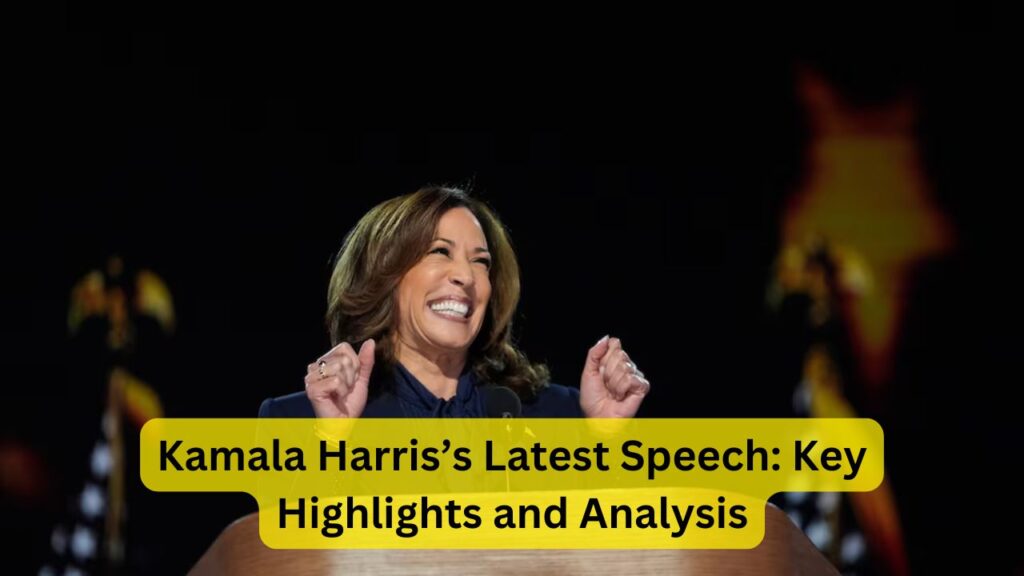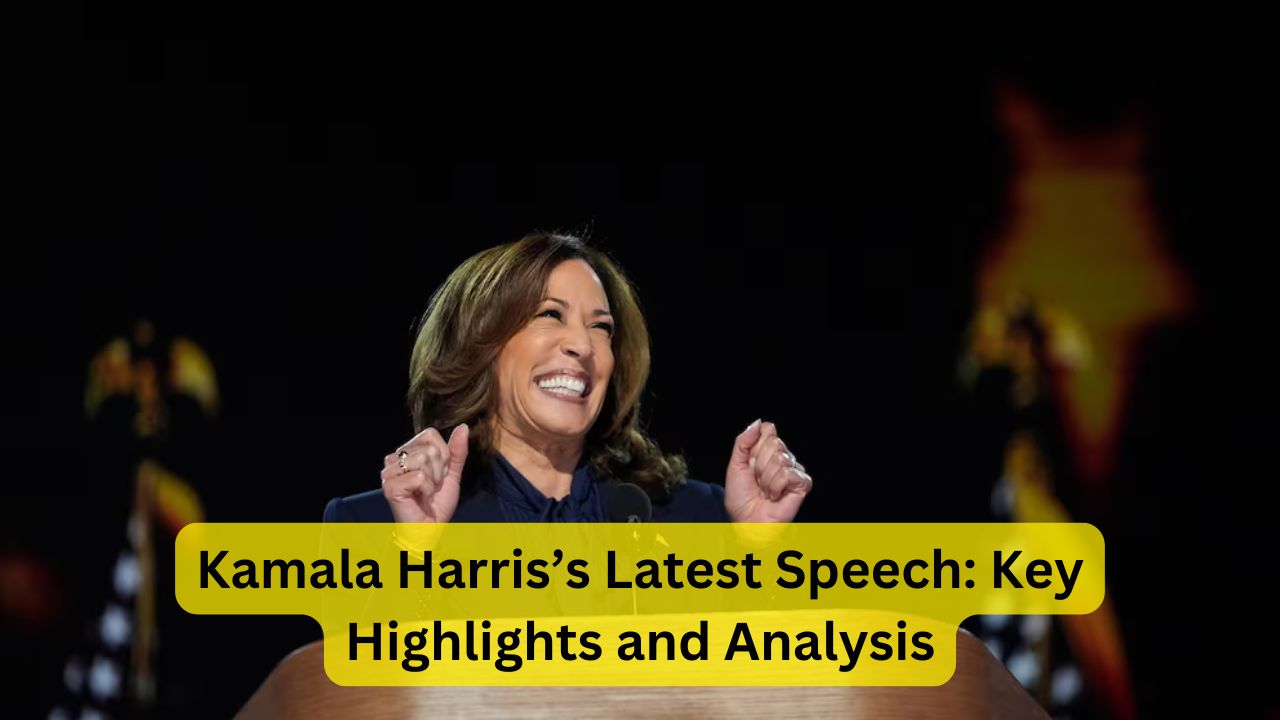
Vice President Kamala Harris delivered a compelling speech recently, addressing crucial issues that resonate deeply with the current socio-political climate. As the first female Vice President of the United States, Harris continues to be a pivotal figure in American politics, and her speeches are often a reflection of the administration’s priorities and future direction. In this article, we will break down the key highlights of her latest address and provide a thorough analysis of its implications.
Introduction to the Speech: Setting the Stage
Vice President Kamala Harris began her speech by acknowledging the challenges facing the nation. She addressed the ongoing issues of economic inequality, climate change, and the importance of safeguarding democracy. Harris’s tone was both urgent and optimistic, as she outlined the administration’s commitment to addressing these challenges head-on.
Economic Equality: A Central Theme
One of the central themes of Harris’s speech was the need for economic equality. She emphasized the importance of building an economy that works for everyone, not just the wealthy. Harris highlighted the administration’s efforts to raise the minimum wage, expand access to affordable healthcare, and invest in education and job training programs. She underscored that these initiatives are essential for closing the economic gap and providing opportunities for all Americans.
Harris also discussed the significance of supporting small businesses, which she described as the backbone of the American economy. She announced new measures to provide financial assistance and resources to small business owners, particularly those in underserved communities. By doing so, the administration aims to foster economic growth from the ground up, ensuring that prosperity is more evenly distributed across the nation.
Climate Change and Environmental Justice
Another critical area addressed in Harris’s speech was climate change and environmental justice. She reaffirmed the administration’s commitment to combatting climate change, describing it as one of the greatest challenges of our time. Harris detailed several initiatives aimed at reducing carbon emissions, transitioning to renewable energy sources, and creating green jobs.
In her remarks, Harris emphasized the need for a just transition, ensuring that communities disproportionately affected by environmental degradation are prioritized in the shift towards a greener economy. This approach not only addresses environmental concerns but also aligns with the administration’s broader goals of equity and justice.
Protecting Democracy: A Call to Action
Vice President Harris also delivered a powerful message on the importance of protecting democracy. She spoke about the recent threats to democratic institutions and the need to defend the integrity of elections. Harris highlighted the administration’s efforts to pass voting rights legislation, which aims to expand access to the ballot, particularly for marginalized communities.
Harris’s speech included a strong condemnation of voter suppression tactics, which she described as an attack on the fundamental rights of citizens. She urged Americans to remain vigilant and active in the democratic process, stressing that the health of the nation’s democracy depends on the participation and engagement of its citizens.
Healthcare: Expanding Access and Equity
Healthcare was another significant focus of Harris’s speech. She addressed the ongoing efforts to expand access to affordable healthcare and reduce disparities in health outcomes. Harris emphasized the importance of continuing the fight to protect and expand the Affordable Care Act, ensuring that more Americans have access to quality healthcare services.
Harris also spoke about the administration’s commitment to addressing the social determinants of health, such as housing, education, and income inequality, which disproportionately affect communities of color. The administration aims to create a more equitable healthcare system that serves all Americans by tackling these underlying issues.
Foreign Policy: Promoting Peace and Stability
On the international front, Harris touched on the administration’s foreign policy objectives, focusing on promoting peace and stability. She outlined the U.S. commitment to working with allies and partners to address global challenges such as terrorism, nuclear proliferation, and cyber threats. Harris also emphasized the importance of diplomacy and multilateralism in resolving conflicts and advancing U.S. interests abroad.
Harris highlighted the administration’s efforts to restore America’s leadership on the global stage, particularly in areas such as climate change, human rights, and international development. The administration seeks to build a safer, more stable world by engaging in these global issues.
Conclusion: A Vision for the Future
In concluding her speech, Vice President Kamala Harris reiterated the administration’s vision for the future—a vision rooted in equity, justice, and opportunity for all. She called on Americans to come together to overcome the challenges ahead, emphasizing that unity and collective action are key to building a brighter future.
Harris’s speech was a comprehensive outline of the administration’s priorities, reflecting a deep commitment to addressing the most pressing issues of our time. Her words resonated with a message of hope and determination, inspiring confidence in the administration’s ability to navigate the nation through these challenging times.
Keynotes: Kamala Harris’s Latest Speech – Key Highlights and Analysis
1. Economic Equality
- Emphasized the need for an economy that benefits everyone, not just the wealthy.
- Discussed raising the minimum wage, expanding healthcare access, and investing in education and job training.
- Announced new support measures for small businesses, particularly in underserved communities.
2. Climate Change and Environmental Justice
- Reaffirmed commitment to combating climate change with initiatives to reduce carbon emissions and create green jobs.
- Stressed the importance of a just transition, prioritizing communities most affected by environmental issues.
3. Protecting Democracy
- Addressed the need to defend democratic institutions and ensure election integrity.
- Highlighted efforts to pass voting rights legislation and condemned voter suppression tactics.
- Urged active citizen participation in the democratic process.
4. Healthcare
- Focused on expanding access to affordable healthcare and reducing health disparities.
- Emphasized the importance of protecting and expanding the Affordable Care Act.
- Addressed social determinants of health, aiming to create a more equitable healthcare system.
5. Foreign Policy
- Outlined U.S. foreign policy objectives, emphasizing peace, stability, and multilateralism.
- Discussed the administration’s commitment to addressing global challenges like terrorism and cyber threats.
- Highlighted efforts to restore U.S. leadership on the global stage, particularly in climate change and human rights.
6. Conclusion
- Reiterated the administration’s vision for equity, justice, and opportunity for all.
- Called for unity and collective action to overcome national challenges.
